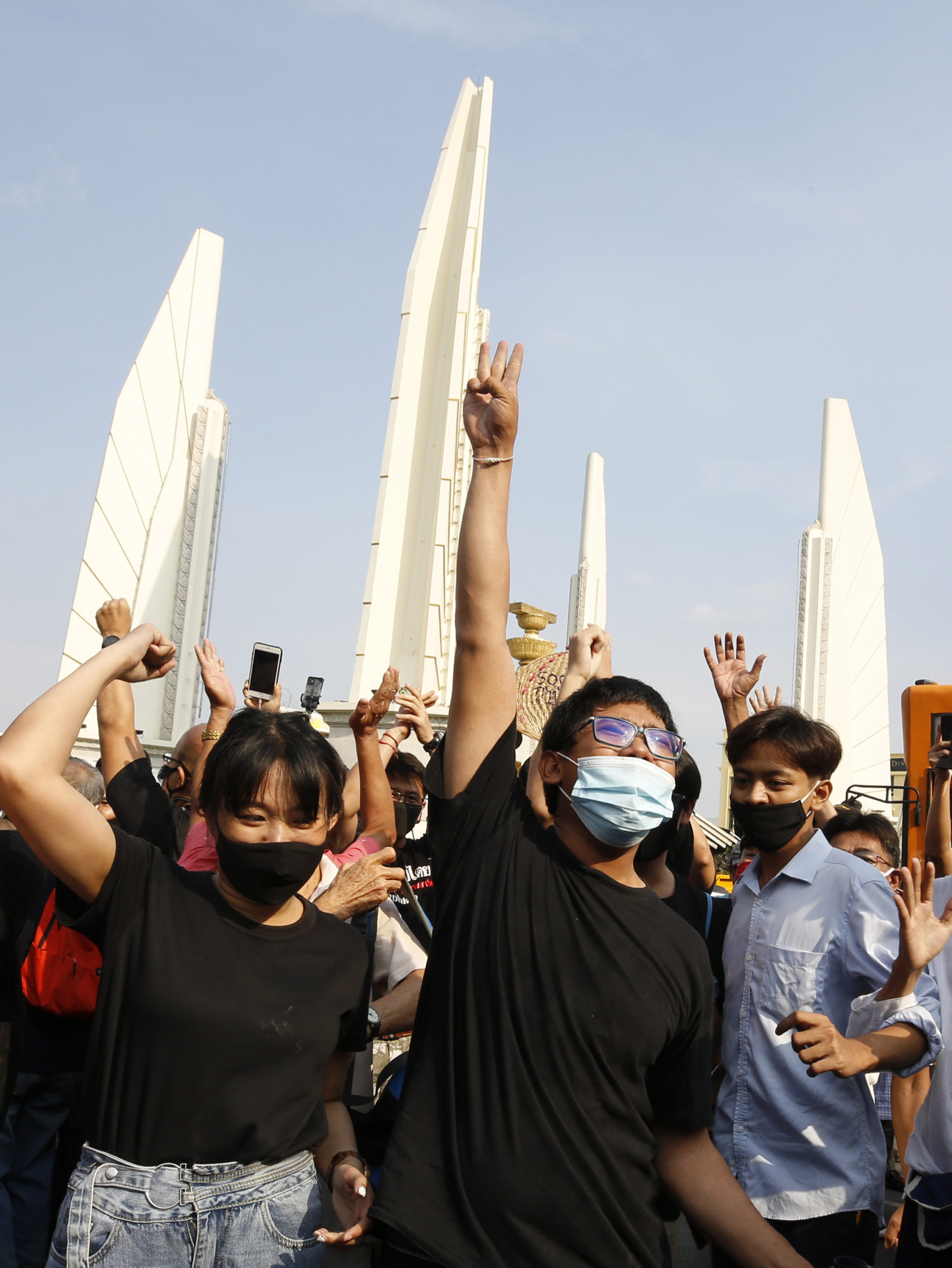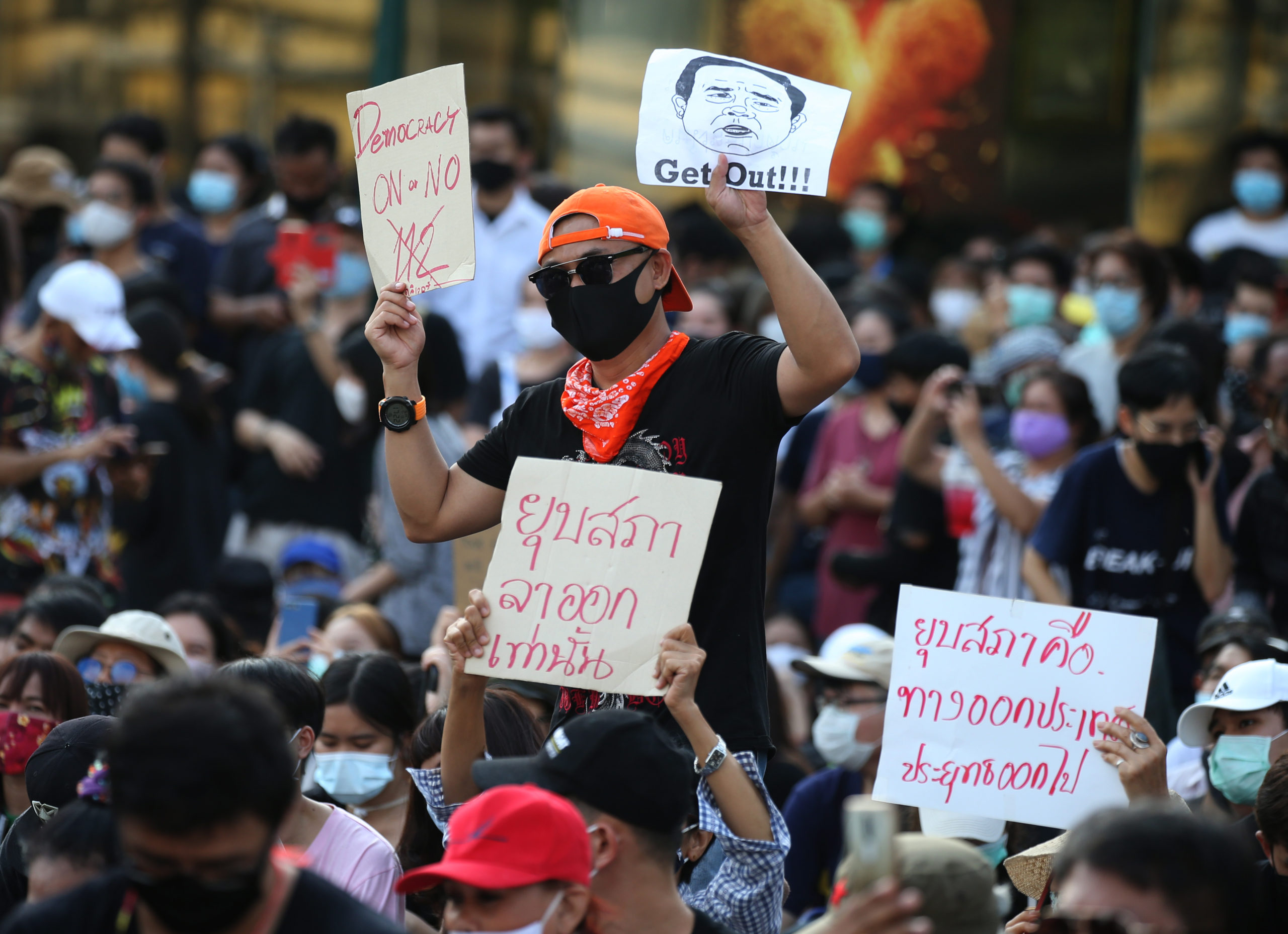Additional reporting by Wanpen Pajai
Undeterred by the pandemic, a political movement is rising among Thai youth.
With demands for Parliament to present plans to dissolve, young Thais are looking past the months-long lull of Covid-19 restrictions and once again pushing for democratic overhaul, starting with a bang at Saturday’s demonstration at Democracy Monument in central Bangkok. If public schedules shared this week on Twitter are any indication, the summer could be host to many protests from disparate groups clamouring to raise their voices for common cause.
The two groups leading the charge last weekend, which drew upwards of 1,000 people to protest the government of former military general and 2014 coup leader Prime Minister Prayuth Chan-o-cha, were the Student Union of Thailand and a new activist group called Free Youth.
The latter group, which formed in November and counts 20 official members, is one of a burgeoning class of youth organisations demanding free and fair elections, calling back to the February dissolution of Thailand’s Future Forward opposition party by the Constitutional Court.
Free Youth secretary-general Ford Tattep Ruangprapikitsere, 23, said the arrest in Rayong of two activists who protested Prayuth’s handling of Covid-19, specifically last week after the prime minister allowed a group of Egyptian airmen to leave their quarantine hotel to go shopping, was the final straw that broke into this most recent display of anger.
“It just showed the government did not care about the citizens and it was not competent,” Ford said, adding that public anger had made the protest simple to organise. “They [the protestors] felt they couldn’t live in a country like this, so that’s why the protest on Saturday was organised.”
If the government does not respond within two weeks of Saturday’s protest with a plan to meet Free Youth’s three demands, Ford said the group will raise its level of involvement.
James Buchanan, a researcher of Thai politics and society, was surprised by the turnout, as well as the energy he saw in the crowd.
“I didn’t even go at first because I didn’t think they’d be that big,” Buchanan told the Globe. Barring the exception of the campus protest right before the onset of the pandemic, since the 2014 coup, demonstrations were drawing the same, dedicated, faces.
“I didn’t think the students would be able to replicate that [energy],” he said of the earlier youth demonstration.
But when the images rolled in Saturday from the growing crowd at the monument, Buchanan recognised that same feeling.
He showed up at the protest that night, and saw what he felt to be a new crowd, a new generation who had not previously protested. For older protestors who had protested for years, he said, protests had become somewhat formulaic.
But not this one.
“I was taken aback and surprised by the numbers, and also just the energy. It’s partly related to the numbers I think, but also partly related to the fact that this is a new generation of protestors, people who have not been to protests before, but have kinda got the spirit of the youth anyway.”
To be successful, he added, the movement must go beyond the university gates to include Thai youth who were not necessarily university-educated, or in the elite middle class. Youth alone won’t be enough either – Buchanan said the young demonstrators will have to attract working-class people and must be cross-generational.
I must admit, I used to keep up with all the individual names and faces and all the groups. There’s been such an outbreak now that I’m starting to lose track
With the pace of growth, that may happen sooner rather than later. Buchanan said it seemed as though new activist groups were forming constantly in the fertile ground of Thai discontent.
“I must admit, I used to keep up with all the individual names and faces and all the groups. There’s been such an outbreak now that I’m starting to lose track,” Buchanan said. “It’s kind of indicative of how this is all snowballing, that I can’t even keep up with all of the new faces and new groups anymore.”
While Covid-19 paused the movement earlier this year, Buchanan believes it may have also bolstered it by stoking anger against Prayuth’s approach to handling the crisis, especially the deep economic fallout of the pandemic. From the extension of privilege to the Egyptian airman, as well as the apparent negligence in lack of oversight of a boxing stadium run illegally during the pandemic, Buchanan believes the government response has been seen as yet another show of incompetence.
This could be seen in the anger at Saturday’s protest.
Ford, 23, was one of Free Youth’s representatives who spoke at the event and rallied the crowd. He told the Globe he was inspired to join a movement for reform against military policies that he believed blocked progress in Thailand. Then a student of political science, Ford credits his education for informing him of the injustices in Thai society that he now works to correct. A member of Thailand’s LGBT community, Ford wants to live in a Thailand committed to equality for all citizens.

EPA-EFE/Narong Sangnak
The politics of his group have a familiar ring to a young generation energised by a social media discourse that has expanded the bounds of political speech through memes and pop-culture-coded references to members of the nation’s ruling elite, including its legally off-limits monarch, Rama X.
If the current chapter of the protest movement is in any way unprecedented, Buchanan said, it is in the increasingly direct reference to displeasure with the king expressed through signs and banners. Speech that criticises the king is illegal in Thailand under the country’s strict lese-majeste law.
Ford didn’t discuss the king, instead focusing his group’s agenda on the Prauth-led civilian government. Free Youth’s top three demands at the protest were for the government to stop harassing citizens, to change the constitution and dissolve parliament for the purpose of a new election. These three demands, Ford said, are the key to unlock to address deeply rooted problems through a more democratic state.
“There is an elite group that includes political elites, people abroad, and business elites that rule the country,” the young activist said. “[These people] create a spider web that keeps the country from moving forward.”
As of now, Ford and other political observers say the current Thai constitution, drafted in 2017 by the National Council for Peace and Order (NCPO) military junta, continues to promote the military role in governance.
Critics point to such stipulations as the selection by the military of all members of the Thai Senate, a bloc that all but secures a bulletproof majority in Parliament for the military-backed Palang Pracharath Party. This structural feature, Ford said, eliminates checks and balances on their power.
There is also a 20-year strategy under which, for the next two decades, elected PMs must be Chair of the National Strategy Committee and follow its orders. Failure to do so could result in the impeachment of cabinet members.
To address these structural issues, Ford believes the constitution must be rewritten by a democratically elected body. He said Free Youth demands a new constitution that limits military power and restores primary power to the Thai people.
The legal campaign against Future Forward and its leader, former businessman Thanathorn Juangroongruangkit, sparked protests at the start of this year in a movement that escalated with the party’s official dissolution in court. Youth organisers launched flash mob demonstrations, including a December gathering in central Bangkok believed to be the largest since the 2014 coup, but ultimately lost momentum with the onset of the Covid-19 pandemic and an official prohibition on gathering in public spaces.
Ford said it’s still not as easy to gather as it was just months ago. Thailand’s active Covid-19 case count has recently hovered near zero but, with restrictions and anxieties still in place, the group of youth organisers had to inform protestors to take precautions and take care of themselves.
Organising in the era of Covid-19 comes loaded with these kind of challenges, which don’t seem to be dissipating anytime soon. But for now, the youth aren’t letting that prevent them from picking up where they left off.
“We will not stop here for sure,” Ford said, promising to “push for more freedom and more political space in the government for both youth and also marginalised groups, and to move the country to a true democracy.”
As for whether or not Parliament would respond to students’ demands and present plans to dissolve, Buchanan was less optimistic. The analyst said that if Thailand’s parliament ever does this, it will more likely be due to inner turmoil and the collapse of the current coalition.
Still, he said the momentum building both online and irl – internet-speak for ‘in real life – is not to be ignored.
“Something is happening,” he said. “I can’t see the students giving in, or the government giving in.”


